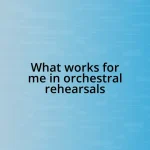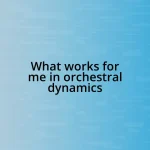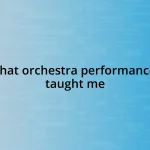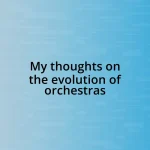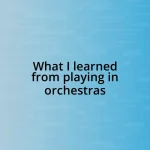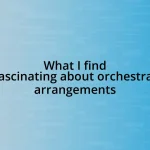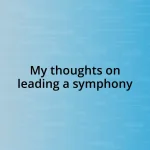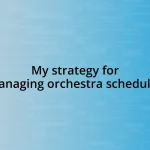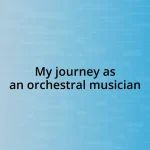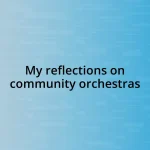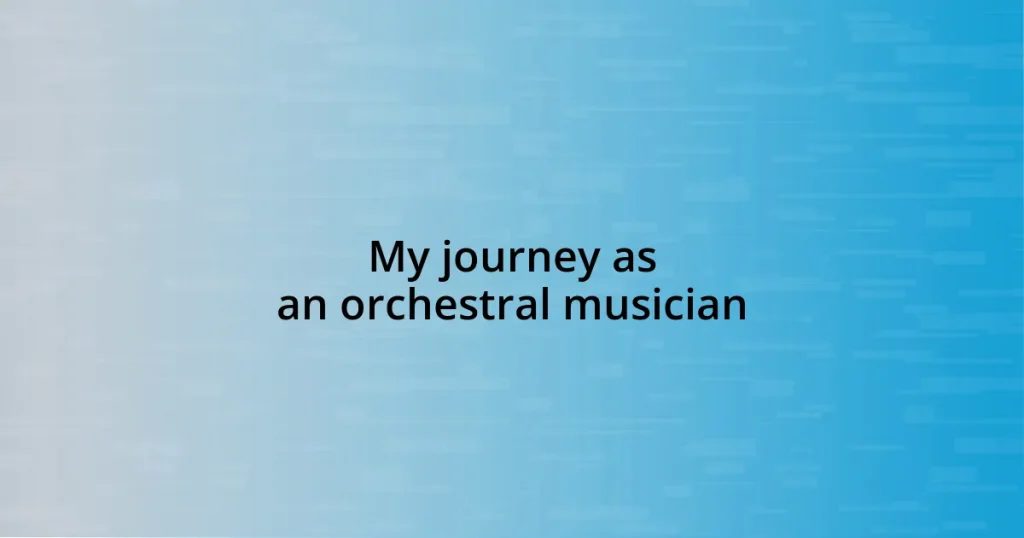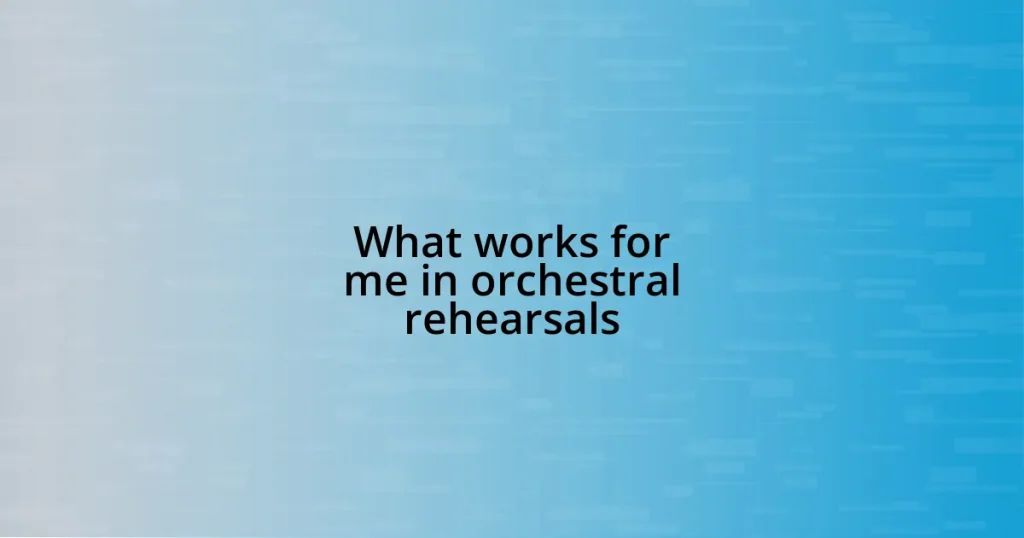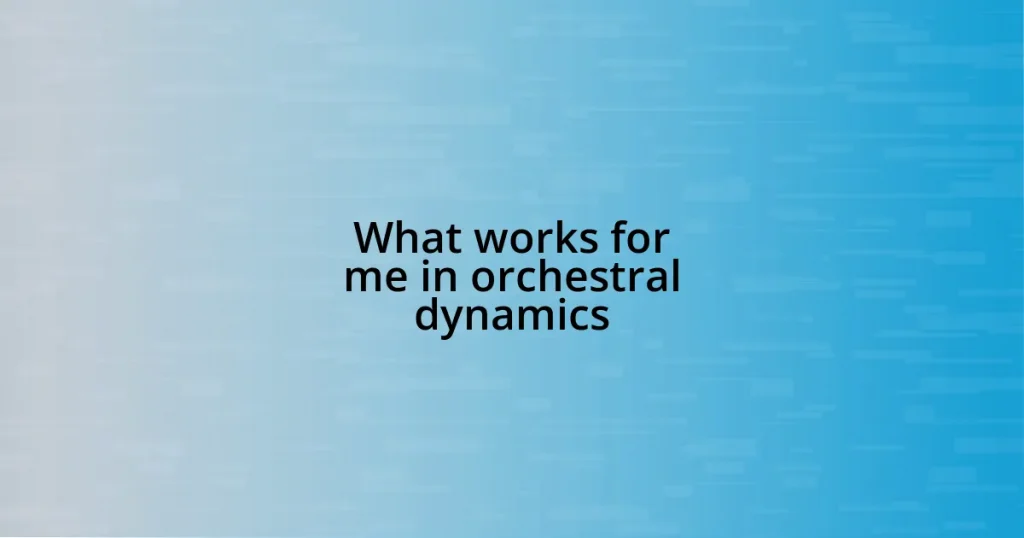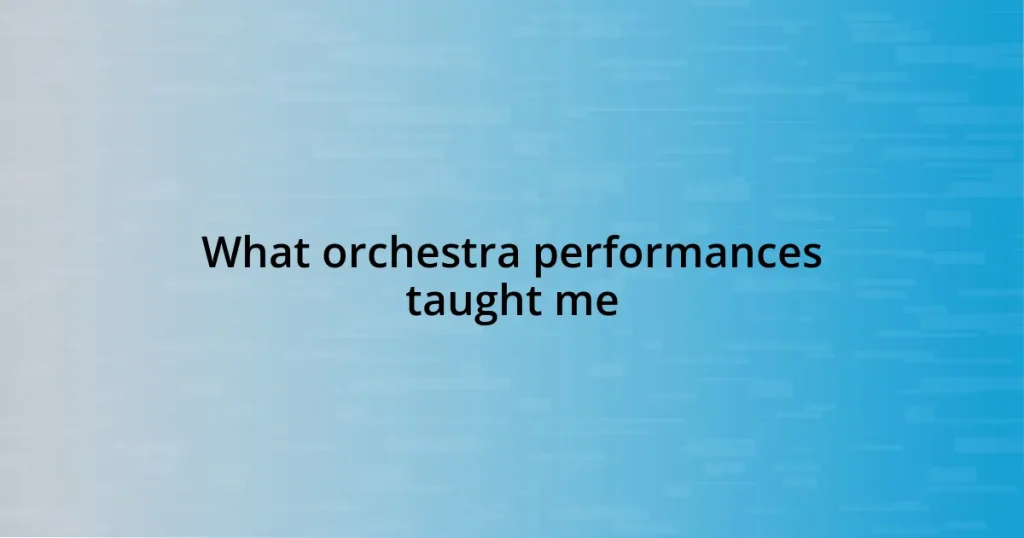Key takeaways:
- The initial excitement of entering a music class and performing for an audience sparked a lifelong passion for music.
- Choosing the right instrument involves considering comfort, sound, music style, availability, and personal inspiration.
- Finding the right orchestra greatly influences musical growth and personal connections within a community.
- Building relationships with fellow musicians enhances collaboration and creates a supportive environment for performances.
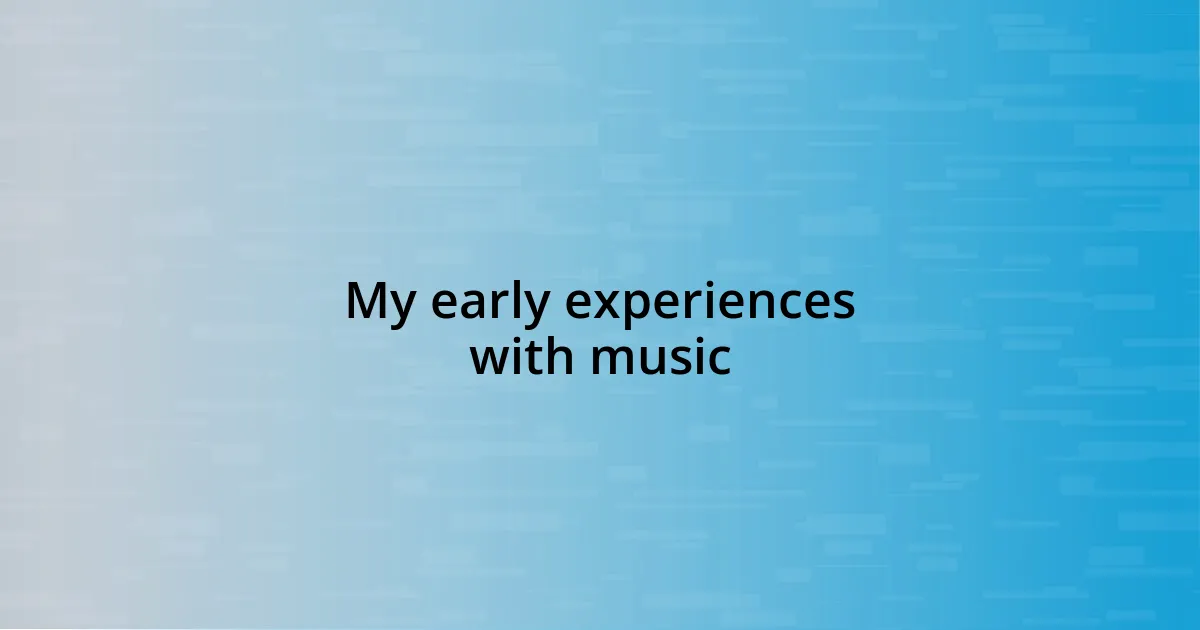
My early experiences with music
I can still recall the thrill of walking into my first music class, the air buzzing with excitement and possibility. I was just a kid, clutching my shiny new flute, feeling both nervous and eager. That moment marked the beginning of my lifelong journey with music, as the sounds of my peers filled the room, blending into a cacophony that felt magical.
One experience stands out vividly in my memory: the first time I performed in front of an audience. My heart raced as I stood on stage, the spotlight washing over me like a warm wave. I thought, “What if I mess up?” Yet, as I began to play, I discovered an unexpected joy in sharing my music—realizing that it was not just about me, but about creating something beautiful for others to experience.
In those early days, I learned that music is more than notes on a page; it’s an emotional language that connects us all. Have you ever felt that rush when a certain piece resonates deeply with you? I have, and it’s a feeling like no other—a reminder that music has the power to evoke emotions and create lasting memories.
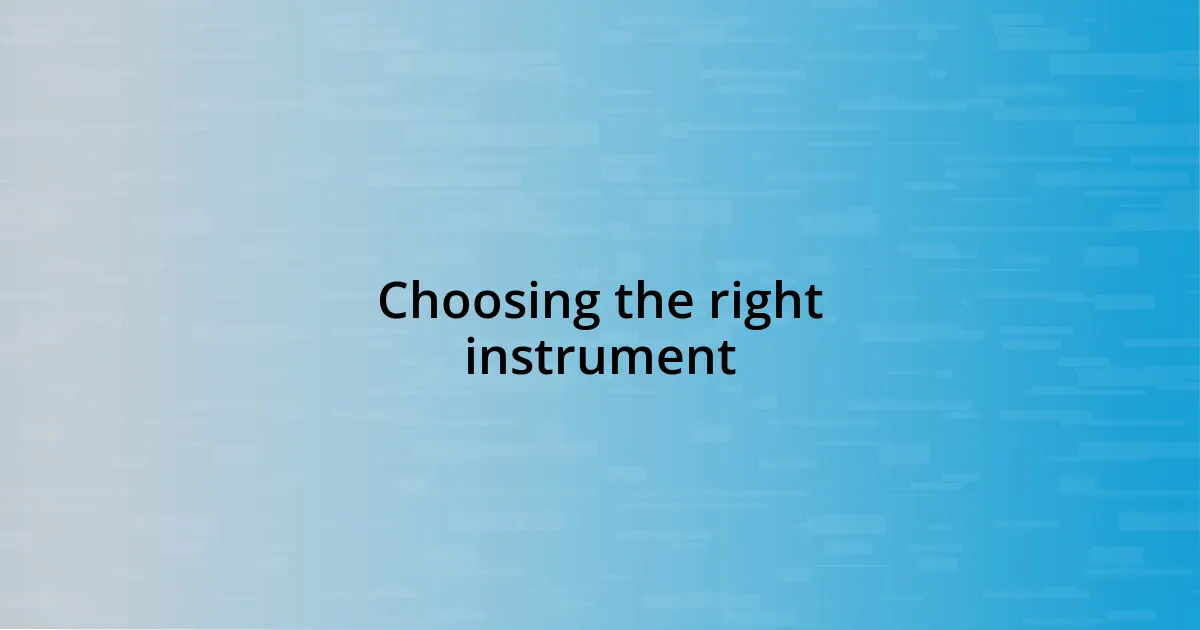
Choosing the right instrument
Choosing the right instrument can shape your musical journey in incredible ways. I remember the moment I was deciding between various instruments, feeling like a kid in a candy store. Each one had its own allure, but I quickly realized it wasn’t just about the sound; it was about how each instrument resonated with my personality.
Here are some key considerations I found helpful when making my choice:
- Comfort: How does it feel in your hands? It should feel natural to play.
- Sound: Do you find the instrument’s tone appealing? This connection is crucial.
- Music Style: Does the instrument fit the genre you wish to explore?
- Availability: Is it easy to access and maintain? I learned that maintenance can be just as important.
- Inspiration: Does it spark excitement every time you pick it up? That passion can fuel your practice and growth.
Reflecting on this decision, it’s clear that the right instrument can become an extension of yourself, a tool for artistic expression that feels just right. Choosing wisely allows you to transform practice into pure joy.
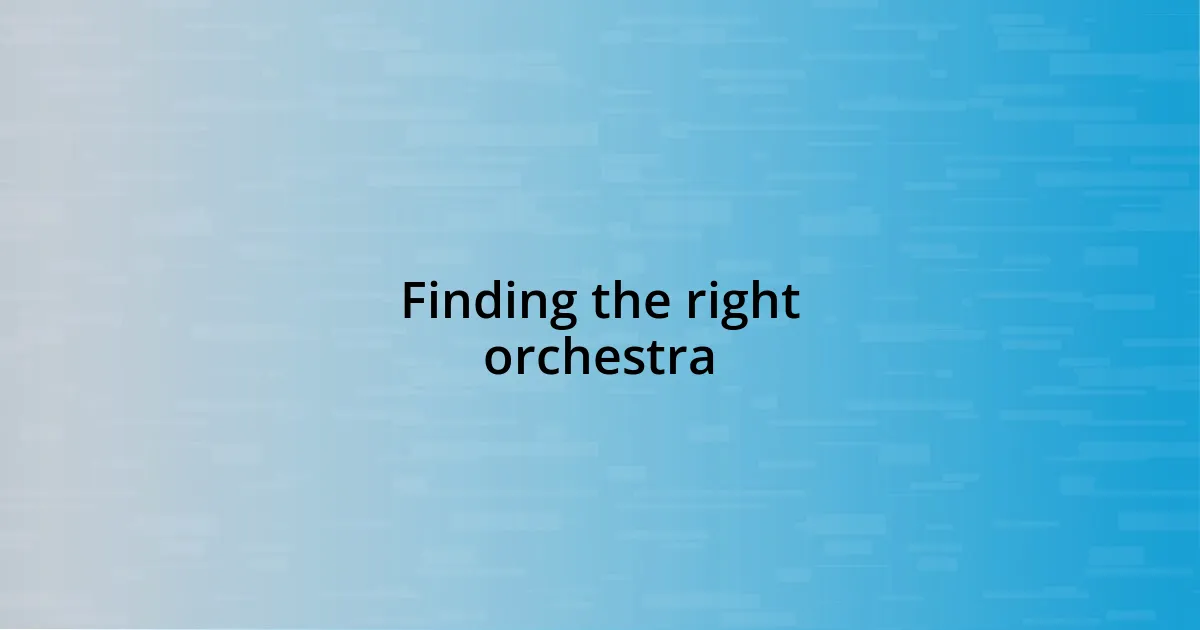
Finding the right orchestra
Finding the right orchestra is a pivotal step in my journey as an orchestral musician. I remember my first experience auditioning for an orchestra. The environment was charged with anticipation, a blend of excitement and nerves rippling through the air. As I tuned my flute, I could feel the urgency of finding a musical home—a space where I truly belonged and could flourish within a collective sound.
It’s fascinating to see how different orchestras foster unique cultures. Some are deeply traditional, rooted in classical repertoire, while others embrace contemporary works and innovative performances. When I joined a community orchestra, I was struck by the camaraderie and joy shared among its members. Have you ever been part of a group that just clicks? That’s exactly how I felt, surrounded by musicians who not only challenged me but also celebrated small victories together. It transformed my view of what an orchestra could be.
The process of selection often requires reflection on personal goals. For example, if you aspire to perform professionally, you might strive for a more competitive orchestra. Alternatively, if learning and growth are your primary aims, a local community group may suit you perfectly. Every choice leads you down a different path, impacting not just your skillset but also your connections in the music world. Remember that finding the right orchestra is as much about the music as it is about the people who inspire you along the way.
| Factor | Community Orchestra | Professional Orchestra |
|---|---|---|
| Culture | Supportive, inclusive environment | Competitive, high standards |
| Repertoire | Varied, often accessible | Classical and contemporary |
| Audition pressure | Less intense | Highly competitive |
| Personal growth | Focus on development | Performance excellence |
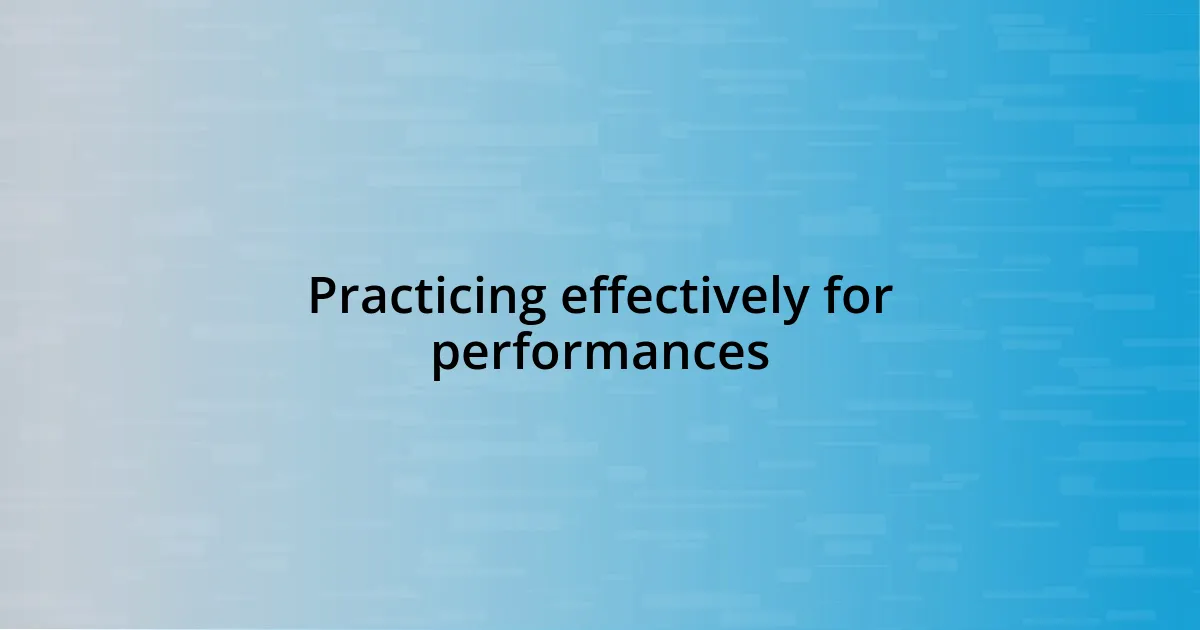
Practicing effectively for performances
Practicing effectively for performances is an art in itself, and I’ve learned that intentional practice makes all the difference. For me, breaking down complex pieces into smaller sections not only makes them more manageable but also allows me to focus on the nuances that bring a composition to life. Have you ever felt overwhelmed by a long piece? I used to feel that way until I discovered the power of isolated work on challenging phrases.
One technique I swear by is the use of a metronome. It’s amazing how much tighter your timing can become with this simple tool. I’ll often push myself to practice slowly, gradually increasing the tempo as I gain confidence. There’s something gratifying about mastering a passage at a crawl before speeding it up; it feels like earning your stripes, building a solid foundation before launching into the performance.
Additionally, incorporating visualization into my practice has profoundly impacted my preparation. I remember vividly rehearsing for a big concert, where I closed my eyes and imagined myself on stage, feeling the energy of the audience. This mental practice not only helps with anxiety but also enhances my musical expression. I find that when I can see myself succeeding, it adds a layer of confidence I carry into every performance. Have you tried visualizing your success in any aspect of your life? It’s a powerful tool that can transform your approach to practice and performance alike.
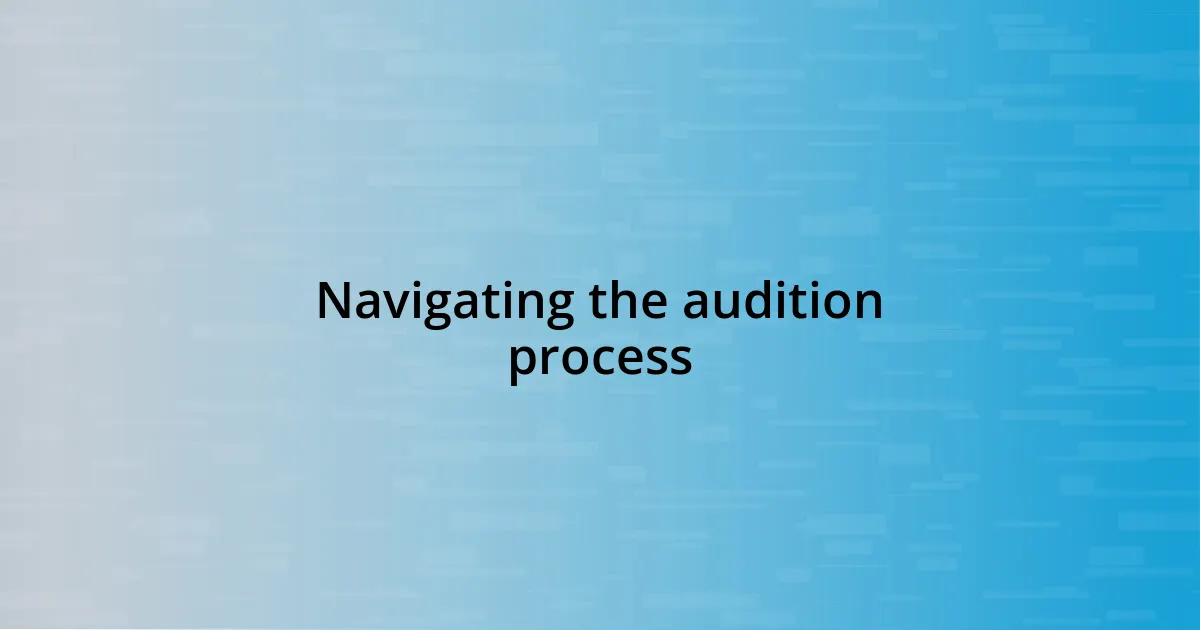
Navigating the audition process
Navigating the audition process can be exhilarating yet daunting. When I stepped into the audition room for my first orchestral tryout, my palms were sweaty, and my heart raced. I remember taking a deep breath, reminding myself that this was my chance to share something unique: my sound, my artistry. Have you experienced that mix of fear and excitement when facing a big moment? It’s a rollercoaster, but embracing those nerves often leads to fantastic outcomes.
Preparation for the audition is key. I discovered that practicing the excerpts is only half the battle; understanding the orchestra’s culture is equally crucial. For instance, I made it a point to listen to recordings of the orchestra I was auditioning for. This not only helped me align my playing style but also gave me a sense of how I might fit within the ensemble’s existing sound. Have you ever taken time to immerse yourself in the environment you aspire to be part of? That connection can transform your performance from just showcasing your skills to truly communicating with the ensemble.
The day of the audition itself was a whirlwind. I vividly recall standing backstage, listening to other musicians play their hearts out, feeling both inspired and intimidated. Once it was my turn, I took one last deep breath, visualizing success. That moment taught me the importance of composure—and that every musician, regardless of their experience, shares similar fears. What I learned is that every audition is not merely about the outcome; it’s about sharing your journey, your passion for music. Keep in mind, each experience, whether triumphant or challenging, is a step forward in your own musical narrative.
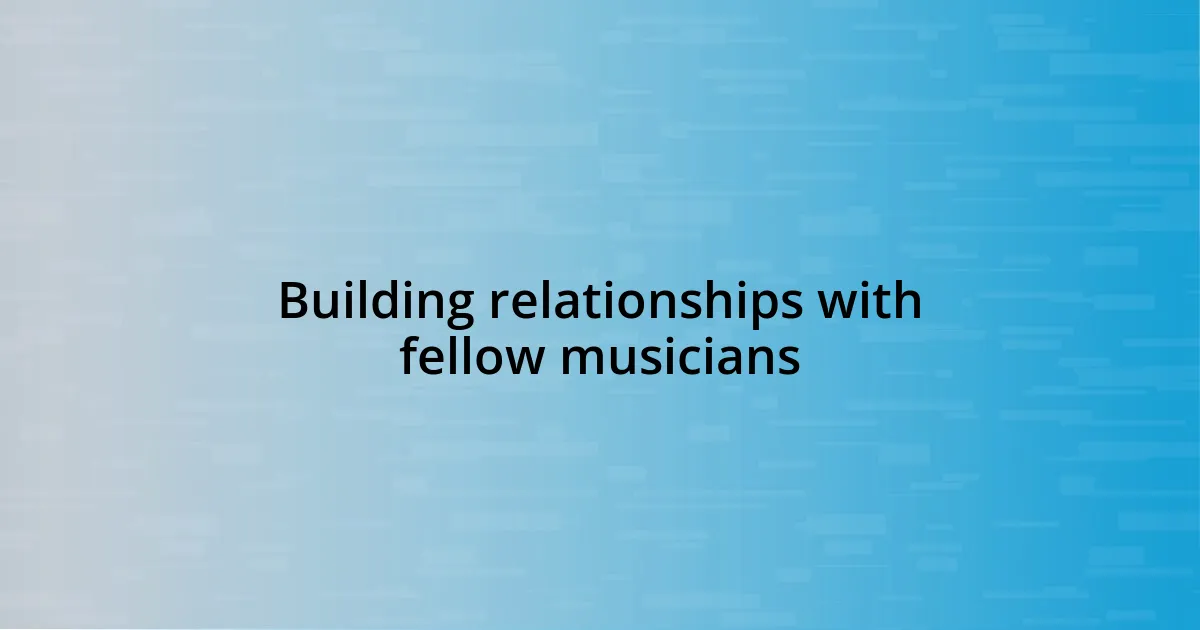
Building relationships with fellow musicians
Building relationships with fellow musicians is not just about camaraderie; it’s a cornerstone of thriving in an orchestral environment. I remember my first rehearsal with a full orchestra. Everyone was enthusiastic, but that initial icebreaker conversation with the principal violist shifted everything for me. The connection we established made it easier to communicate through music, transforming an intimidating experience into a collaborative journey. Have you experienced that moment where a simple conversation opens so many doors?
I’ve found that sharing meals or casual hangouts after rehearsals often catalyzes deeper friendships. One time, our section went out for pizza after a long week of rehearsals. It turned out to be more than just a meal; it became a space where we could share tips, frustrations, and laughter. These light-hearted moments outside of the concert hall foster trust and understanding, creating a cohesive unit that plays better together. Isn’t it curious how breaking bread can solidify a bond that enhances performances?
Additionally, I’ve learned that showing vulnerability can strengthen these relationships. During one particularly challenging concert season, I admitted to a few fellow musicians that I was struggling with anxiety about our repertoire. They responded with their own stories and support, making me realize that we were all in the same boat, navigating our insecurities together. That shared vulnerability created an atmosphere of empathy and encouragement. Have you ever found strength in sharing your struggles with others? It’s a reminder that in the world of music, every note is intertwined with personal connections and mutual encouragement.
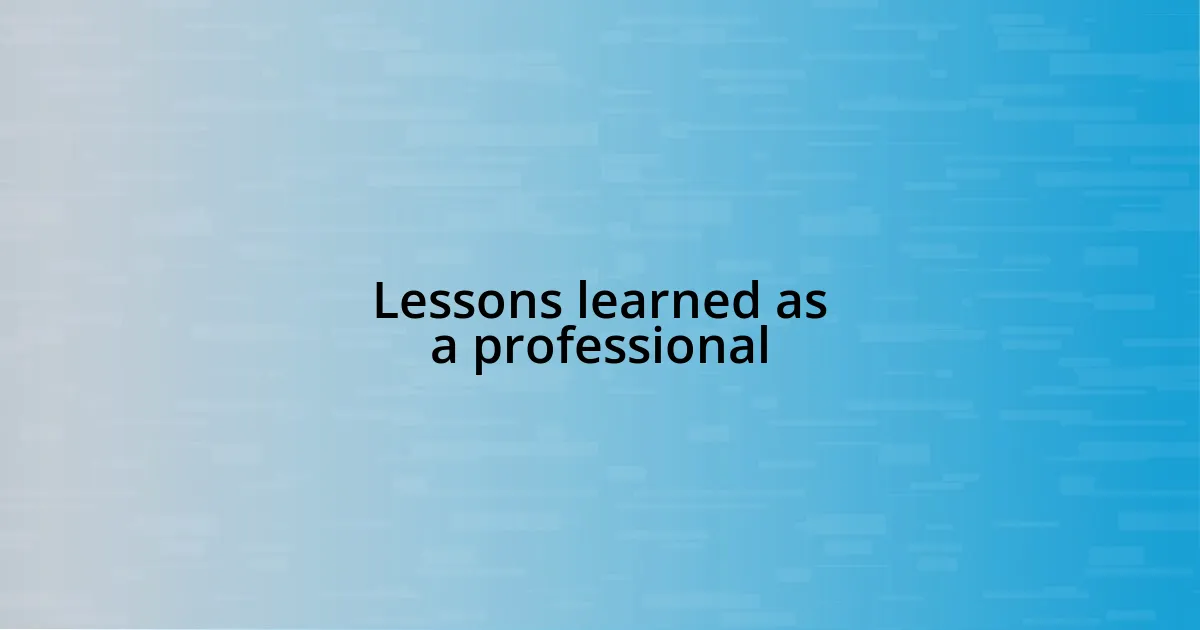
Lessons learned as a professional
One of the most profound lessons I learned as a professional orchestral musician is the value of adaptability. I once found myself in a situation where a last-minute change in the concert program meant I had to learn a challenging piece overnight. I can still recall the adrenaline pumping through my veins as I dove into the music. It was stressful, but that experience taught me to embrace unpredictability. Have you ever had to adapt quickly to unexpected changes? I realized that flexibility not only enhances your skill set but also builds resilience in high-pressure settings.
Another key insight I’ve gathered is the importance of self-care. There was a time when I pushed myself too hard during a grueling concert season, and the toll became evident. I started experiencing physical fatigue and mental burnouts, which impacted my playing. Eventually, I had to learn to prioritize my well-being, integrating regular breaks and mindful practices into my routine. Have you ever felt like you were running on empty? Taking the time to recharge isn’t just beneficial; it’s essential for sustained performance and creativity.
Lastly, the art of constructive criticism has been invaluable. I remember a rehearsal where a conductor pointed out nuances in my playing that I had overlooked. At first, I felt defensive, but as I listened more closely to the feedback, I discovered opportunities for growth. This experience highlighted the importance of viewing feedback as an investment in my artistry rather than a personal critique. How do you perceive criticism in your professional life? By embracing it, I’ve evolved not just as a player but also as a collaborator and communicator within the orchestra.

